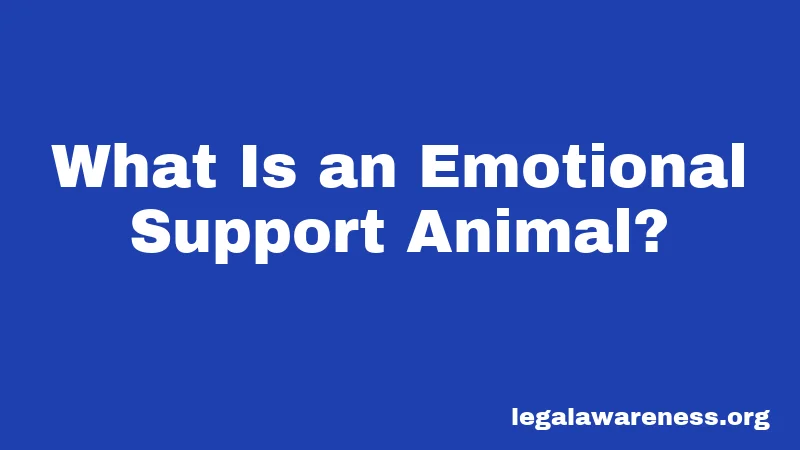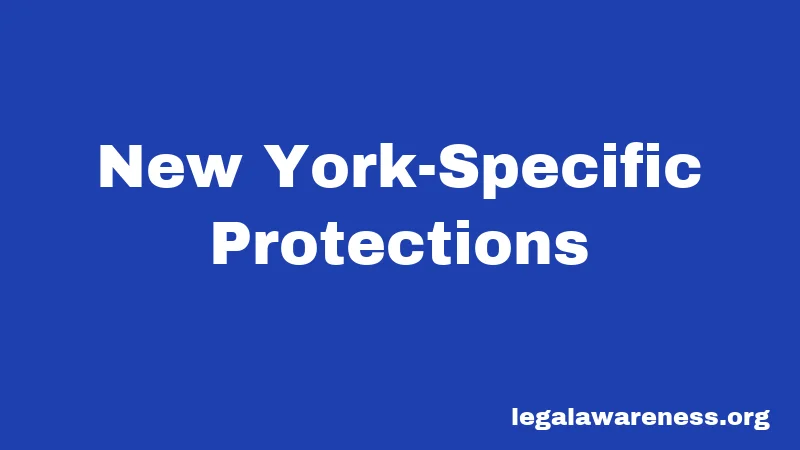ESA Laws in New York (2026): Your Rights Start Here
Most people have no idea what rights they have with emotional support animals. Seriously. In New York, ESA laws are pretty specific, and the protections can be life-changing if you understand them. Let’s break down exactly what you need to know.
Your emotional support animal isn’t just a pet. With the right documentation, your ESA has legal protections that regular pets don’t get. That means no breed restrictions. No pet deposits. And landlords can’t just say no because they don’t like animals.
What Is an Emotional Support Animal?

An emotional support animal is a companion whose presence helps manage symptoms of a mental or emotional disability. Depression, anxiety, PTSD, OCD—these all qualify. The animal doesn’t need special training like a service dog does. Their job is simply to be there for you.
Here’s the key difference: service dogs are trained to perform specific tasks. ESAs provide comfort and emotional support just by existing in your life. Both are valuable, but they have different legal protections.
Sound simple? It actually is. If your dog, cat, rabbit, or other domesticated animal helps your mental health, they could qualify as an ESA.
Basic Housing Protections
Wondering if this applies to you? Let’s talk housing first.
Under the Fair Housing Act, landlords must allow emotional support animals as a reasonable accommodation. Even in buildings with strict no-pet policies. Even if the lease says absolutely no animals allowed.
This is federal law. It applies everywhere in New York, from Manhattan to Buffalo to small towns upstate.
Your landlord cannot charge you pet rent. They cannot demand a pet deposit. They cannot enforce breed restrictions or weight limits on your ESA.
Hold on, this part is important. You do need proper documentation—an ESA letter from a licensed mental health professional. Without that letter, your animal is legally just a pet.
New York-Specific Protections

New York takes ESA housing rights seriously. The state has its own protections on top of federal law.
The New York State Human Rights Law reinforces your right to live with your ESA. In New York City specifically, the NYC Commission on Human Rights enforces these protections aggressively. They have some of the strictest penalties in the entire country for landlords who discriminate.
Honestly, this is the part most people miss. NYC provides an extra layer of protection. If a landlord denies your ESA request without valid reason, you can file a complaint directly with the NYC Commission on Human Rights.
One unique thing about New York: housing providers can require proof that your ESA dog has current vaccinations. This is actually mandated by New York State law. So keep those vet records handy.
Getting a Valid ESA Letter
Let me break this down step by step.
You need a letter from a licensed mental health professional. This means a therapist, psychologist, psychiatrist, licensed clinical social worker, or similar provider who is licensed in New York.
The professional must conduct an actual evaluation. They need to assess your mental health condition and determine that an ESA would help manage your symptoms.
Your ESA letter must include specific information. The provider’s name, license number, and contact information. Your name. A statement that you have a qualifying condition and that the ESA is part of your treatment plan. The date and the provider’s signature. It should be on official letterhead.
Not sure what counts as a valid evaluation? It can be done in person or through telehealth. What matters is that a real licensed professional actually evaluates you. New York is strict about this.
Beware of instant online ESA letters that promise approval without an evaluation. These are scams. Landlords can verify your provider’s credentials, and fake letters will get rejected.
Trust me, it’s worth doing this right.
What Landlords Can and Cannot Do

Your landlord can ask for your ESA letter. That’s legal. They can verify that your mental health provider is actually licensed in New York.
For ESA dogs, they can require vaccination proof as mentioned earlier. They can also ask if the animal poses a direct threat to others or would cause significant property damage.
But wait, here’s what they cannot do. They cannot ask about your specific diagnosis. They cannot demand to know details about your disability. They cannot reject your ESA based on breed, size, or weight alone.
Landlords cannot charge extra fees. No pet rent, no pet deposit, no additional insurance requirements for your ESA.
If your ESA causes actual damage to the property, you’re still responsible for that. This is fair. But you can’t be charged extra just for having the animal.
Where ESAs Can and Cannot Go
Okay, pause. Read this carefully.
ESAs do NOT have public access rights in New York. This confuses a lot of people. Your emotional support animal cannot go into restaurants, stores, movie theaters, or other public places unless that business chooses to allow it.
Only service animals have public access rights under the Americans with Disabilities Act. ESAs are not service animals.
Trying to bring your ESA into public places by claiming it’s a service animal? That’s illegal. Under proposed New York statute S5435, falsely representing a pet as a service animal could result in fines up to $250.
Pretty straightforward, right? Your ESA has strong housing protections. But not the same public access rights as service dogs.
Flying with Your ESA
Here’s where it gets tricky.
As of 2021, airlines are no longer required to accommodate emotional support animals. The Air Carrier Access Act was updated, and now only psychiatric service dogs qualify for free cabin access.
Most airlines treat ESAs as regular pets now. That means pet fees, carrier requirements, and all the standard pet travel rules.
Not what you wanted to hear? I get it. But this is the current reality across the entire country, not just New York.
If you need to fly frequently with an animal for psychiatric reasons, you might want to look into whether your animal could qualify as a psychiatric service dog instead. That’s a different process with different requirements.
ESAs at Work and School
Emotional support animals are not automatically allowed in workplaces. The Americans with Disabilities Act covers service animals in employment settings, but not ESAs.
You can ask your employer if they’ll allow your ESA as a reasonable accommodation. Some employers say yes voluntarily. Others don’t. You don’t have an absolute right here like you do with housing.
Same deal with schools and colleges. Public K-12 schools follow ADA rules, which means service animals yes, ESAs not automatically. Colleges and universities have their own policies.
Wondering if it’s worth asking anyway? Absolutely. The worst they can say is no.
Penalties for Misrepresentation
Let’s talk about what happens when people break the rules.
Falsely claiming your pet is a service animal when it’s actually an ESA is fraud. Under the proposed New York statute S5435, you could face fines up to $250.
New York takes this seriously because fake service animals make life harder for people with real service dogs. It’s also just plain dishonest.
Using fake ESA letters or documentation can have legal consequences too. New York, especially NYC, enforces these limitations aggressively.
Don’t risk it. Get legitimate documentation from a real licensed mental health professional.
How to Request ESA Accommodation
Ready to request accommodation from your landlord? Here’s what you do.
Get your ESA letter from a licensed New York mental health professional first. Make sure it includes all the required information.
Submit a copy of the letter to your landlord or property management company. You can do this in writing or email. Keep a copy for yourself.
Your landlord should respond within a reasonable time. If they deny your request, they need to provide a valid reason. “We don’t like animals” is not valid. “The animal poses a direct threat” would need evidence.
If your request is denied unfairly, you have options. File a complaint with HUD, the U.S. Department of Housing and Urban Development. In NYC, you can also file with the NYC Commission on Human Rights.
Consider talking to a lawyer who specializes in housing discrimination if needed. Many offer free consultations.
Common Misconceptions
You’re not alone, this confuses a lot of people.
Misconception #1: ESAs can go everywhere service dogs go. Nope. Housing rights yes, public access no.
Misconception #2: You can just buy an ESA certificate online and you’re good. Wrong. Only a letter from a licensed mental health professional counts.
Misconception #3: Landlords have to accept any animal. Not quite. Dangerous animals or animals that cause excessive damage can still be denied.
Misconception #4: ESA letters last forever. Most should be updated annually.
Makes sense, right?
Renewing Your ESA Letter
Here’s something important: ESA letters don’t last forever.
Most landlords want letters dated within the past year. Some accept letters up to two years old, but annual renewal is safer.
Schedule a follow-up appointment with your mental health provider before your letter expires. They’ll reassess whether the ESA is still necessary for your mental health.
The renewal process is usually simpler than the initial evaluation. Your provider already knows you and your situation.
Set a reminder on your phone. Seriously. Don’t let your letter expire and then scramble to renew it when your landlord asks for updated documentation.
What If Your Landlord Says No?
So what happens if your landlord denies your ESA request?
First, ask for the denial in writing with a specific reason. Landlords must provide legitimate justification.
Valid reasons for denial include: the animal poses a direct threat to health or safety, the animal would cause substantial property damage, or allowing the animal would create undue financial burden on the housing provider.
“We have a no-pet policy” is not a valid reason. “We don’t like dogs” is not valid. “The animal is too big” is not valid by itself.
If the denial seems unfair, respond in writing. Politely explain why you believe you’re entitled to the accommodation under the Fair Housing Act.
Still denied? Time to escalate. File a complaint with HUD. They investigate housing discrimination claims and can order landlords to comply.
You can also contact the NYC Commission on Human Rights if you’re in New York City. They’re known for taking these cases seriously.
Multiple ESAs
Can you have more than one emotional support animal? Actually, yes.
New York has no numeric cap on ESAs. But your mental health provider needs to document why each animal is necessary for your disability.
One ESA might be reasonable. Five ESAs raises questions. Your provider should be prepared to explain the therapeutic need for multiple animals.
Landlords can still assess whether multiple animals would create an undue burden. But they can’t deny you just because you have more than one.
Special Situations
What about temporary housing like shelters?
Even shelters and other temporary housing must permit ESAs under the Fair Housing Act. You still need valid documentation.
New York City shelters specifically recognize ESAs. The NYC Department of Social Services allows approved emotional support animals in shelter housing.
Hotels and Airbnbs? These are trickier. Hotels can require ESAs to stay in pet-friendly rooms and charge pet fees because hotels are subject to ADA rules, not Fair Housing Act rules.
Airbnb hosts have more discretion. Some allow ESAs, others don’t. It varies by individual host.
Resources and Support
Need help understanding your rights? Several organizations can assist.
The NYC Commission on Human Rights provides guidance on ESA housing rights. Their website has detailed fact sheets.
The U.S. Department of Housing and Urban Development (HUD) handles federal Fair Housing Act complaints. They have a hotline and online complaint system.
The New York State Division of Human Rights investigates discrimination complaints throughout the state.
Disability Rights New York is a nonprofit that provides free legal services for disability-related issues, including ESA housing cases.
Don’t be afraid to reach out. These resources exist to help you.
Stay Informed
Laws can change. Honestly, they do change.
New York statute S5435 about service animal misrepresentation is still proposed as of 2026. It might pass, or it might not. Keep an eye on it.
Always verify current requirements before making assumptions. Check official government websites for the latest information.
When in doubt, consult a lawyer or contact one of the advocacy organizations mentioned above.
Your rights matter. Your mental health matters. And your emotional support animal matters.
Frequently Asked Questions
Do I need to register my ESA in New York? No. There is no official ESA registration in New York or anywhere in the U.S. Registration services are scams. You only need a valid ESA letter from a licensed mental health professional.
Can my landlord interview my therapist about my disability? No. Your landlord can verify that your provider is licensed, but they cannot ask about your specific diagnosis or treatment details. That’s protected health information.
What if I already live somewhere and just got an ESA? You can request accommodation at any time, not just when you first move in. Submit your ESA letter to your landlord and request the accommodation. They must respond to your request.
Can my landlord ban certain breeds of ESA? No. Breed, size, and weight restrictions cannot be applied to emotional support animals. The only exception is if the specific animal poses a direct threat, which must be based on the individual animal’s behavior, not breed stereotypes.
How long does an ESA letter last? Most ESA letters are valid for one year. Some providers date them longer, but annual renewal is recommended. Many landlords require letters dated within the past 12 months.
Final Thoughts
Now you know the basics. ESA laws in New York provide strong housing protections when you have proper documentation from a licensed mental health professional.
Get a legitimate evaluation. Get a valid letter. Submit it to your landlord. Know your rights.
Your emotional support animal can make a real difference in managing your mental health. Don’t let confusion about the law keep you from accessing the accommodations you need.
Stay informed, stay safe, and when in doubt, reach out to the resources mentioned above or consult a lawyer.
References
- Fair Housing Act (FHA) – U.S. Department of Housing and Urban Development – https://www.hud.gov/program_offices/fair_housing_equal_opp/fair_housing_act_overview
- New York State Human Rights Law – New York State Division of Human Rights – https://dhr.ny.gov/
- NYC Commission on Human Rights – Emotional Support Animals in Housing – https://www.nyc.gov/site/cchr/
- Americans with Disabilities Act (ADA) – U.S. Department of Justice – https://www.ada.gov/
- Air Carrier Access Act Updates – U.S. Department of Transportation – https://www.transportation.gov/individuals/aviation-consumer-protection/service-animals
